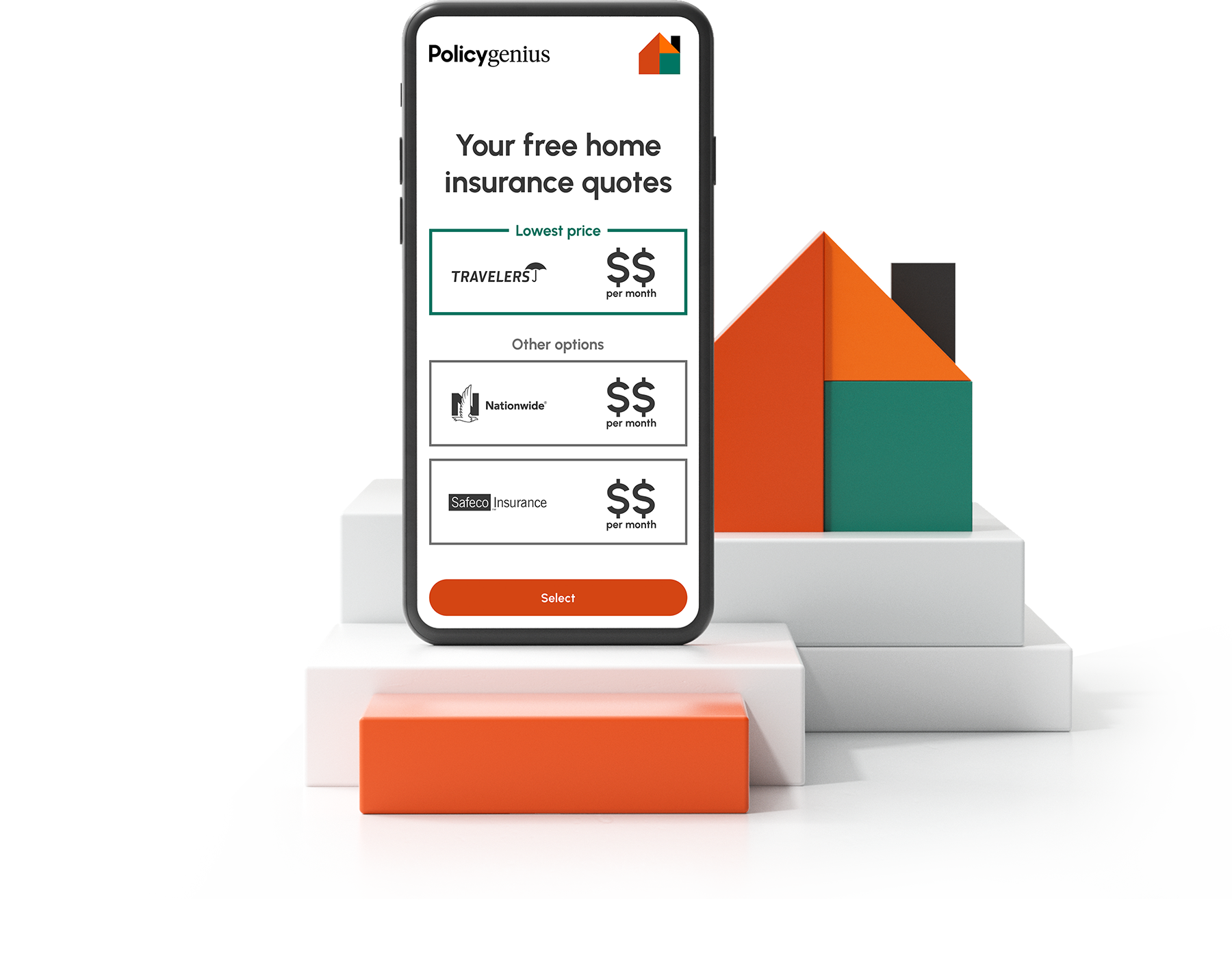Find your home's replacement cost
Your homeowners insurance coverage amounts should be based on the replacement cost of your home, meaning the cost to rebuild it from the ground up. Replacement cost estimates are based on factors such as the home's size and number of rooms, as well as local construction and labor costs in your area. This is amount is different from the home's market value, which is the price you'd pay for it on the real estate market.
While no replacement cost estimate is exact, there are certain methods of calculating it that are more accurate than others. In this guide, we’ll explain what replacement cost is and show you the best ways to calculate it.
What is the replacement cost of a home?
The replacement cost of a home is the amount it would cost to rebuild your property using similar materials in the event that it is damaged. Replacement cost is a calculation of various factors, including your home's size, local construction and labor costs, and your home's construction style.
For example, say you file a roof damage claim after a storm. To determine your reimbursement amount, your insurance company would calculate how much it'd cost to replace your damaged roof with one of similar type and quality. That means if your damaged roof is made of solar shingles, your insurer should reimburse you for the value of new ones rather than asphalt or a different kind of roofing material.
Is replacement cost the same as dwelling coverage?
No, but your home’s replacement cost will determine how much dwelling coverage you need. Dwelling coverage is the part of your homeowners insurance policy that pays to rebuild your home from the ground up after a covered disaster. Once you know your home’s replacement cost, you’ll have an idea of how much dwelling coverage to buy.
Why market value differs from replacement cost
Replacement cost is the amount it would cost to rebuild your home from the ground up with construction materials of similar type and quality, while market value is how much your home is worth, taking into account its location, land value, curb appeal, and other factors.
A home's market value is often higher — though it can occasionally be lower — than its replacement cost, and rarely are the two amounts the exact same. This is all to say that basing your home insurance coverage on the market value of your home could leave you vastly over or underinsured.
According to our Policygenius Home Insurance & Inflation Shopping Survey, only 33% of homeowners are "very sure" their policy's dwelling coverage limits are high enough to cover the cost to rebuild their home if it's destroyed. And even fewer homeowners have valuable coverage add-ons they need to to offset rising costs due to inflation and the increase in natural disasters.
Learn more >> Replacement cost vs. market value
Actual cash value vs. replacement cost coverage
Actual cash value (ACV) is a property loss valuation method on some home insurance policies that subtracts depreciation from the property's replacement cost to determine the reimbursement amount of a claim. Depreciation is based on the age or wear and tear of the insured item or property.
For example, say you purchased a $2,000 television five years ago. With actual cash value coverage, you'd be reimbursed for the replacement value of the television minus five years of depreciation. With replacement cost coverage, the insurance company would pay you the cost of replacing the television at today's prices.
When paying out replacement cost claims, insurers typically send an actual cash value payment first, followed by a check with the recoverable depreciation amount once you've spent the ACV funds.
Actual cash value policies are cheaper than replacement cost policies, but they provide lower claim payouts if your property is damaged or stolen.
How to calculate your home's replacement cost
The fastest and simplest way to calculate your home's replacement cost is to multiply the square footage of your home by the local rebuild cost per square foot in your area.
But there are a few other ways to get a replacement cost estimate for your homeowners insurance policy.
1. Use the insurance company’s estimate
When you get a quote from a homeowners insurance company, the initial dwelling coverage recommendation is based on the insurer’s replacement cost estimate. Insurance companies use their own replacement cost estimate tools to calculate your home’s replacement cost value. The value is calculated based on details provided in your insurance application and property data obtained from third-party companies.
2. Hire a licensed appraiser or contractor
Hire a local contractor or appraiser who is qualified in replacement cost estimates. They will likely conduct an inspection of both the inside and outside of your home and take note of everything that would go into a full rebuild. The appraised value will likely provide the most accurate replacement cost estimate, but it’s also the most expensive option.
3. Use an online replacement cost calculator
There are several replacement cost calculators available online which can offer more comprehensive rebuild estimates of your home. These tools take the same factors into consideration that an insurance company does when calculating your replacement cost estimate, such as the square footage, age of your home, and its roof and foundation type.
Factors that impact your home’s replacement cost estimate
Replacement cost value is impacted by a variety of factors related to your home, such as its size, age, construction style, number of bedrooms, and the cost of construction per square foot where you live.
Here are a few main factors that can impact the cost to rebuild your house:
Square footage: Replacement cost value is most closely correlated with square footage, since the larger a home is the more it will cost to rebuild.
Number of rooms: The number of bathrooms or bedrooms in your home can also impact your home’s replacement cost.
Interior features: Cabinetry, fixtures, and built-in appliances are all included in your home’s replacement cost estimate.
Age of your home: The age of your home can also have an impact on its replacement cost. Older homes are more likely to have custom details and construction materials that are more expensive at today’s prices.
Roof and foundation type: Insurers consider the age and makeup of your home’s structure, including its roof and foundation, when calculating its rebuild value.
Renovations and additions: Major renovations made to your home will increase your home’s replacement cost.
How to protect your home from rising replacement costs & natural disasters
Even if you're certain that your home's dwelling coverage limit is based on the property's actual replacement cost, it still might not be enough to rebuild your home if it's badly damaged or destroyed.
Rebuild costs often skyrocket in the wake of natural disasters due to the high demand for construction materials and labor, in some cases beyond the coverage limits in your policy.
What is extended and guaranteed replacement cost?
Extended replacement cost and guaranteed replacement cost are two different dwelling coverage enhancements that provide added protection for your home. In the event your house is destroyed in a disaster and the cost to rebuild it is suddenly higher than your policy's dwelling coverage limit, these coverages will automatically kick in to cover the increased costs.
Extended replacement cost: If your home is destroyed and the cost to rebuild it exceeds your policy's dwelling coverage limit, extended replacement cost coverage will pay for the difference — usually up to an extra 25% or 50% of your policy limit. In other words, if a home was insured for $500,000 and was covered for an additional 25% in extended replacement cost coverage, it would actually be insured for $625,000.
Guaranteed replacement cost: If your home is destroyed and the cost to rebuild it exceeds your policy's dwelling coverage limit, guaranteed replacement cost coverage will pay to have your home fully rebuilt, with no percentage cap to how much it will pay out. In other words, you're guaranteed for a full rebuild if your house is destroyed, even if construction costs are 300% higher than your dwelling coverage limit.
Depending on your insurance company, you may be able to add extended and guaranteed replacement cost coverage to your homeowners insurance for an additional cost.





